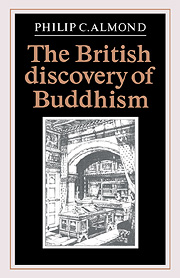Book contents
3 - The Buddha – from myth to history
Published online by Cambridge University Press: 02 December 2009
Summary
THE BUDDHA AND THE GODS
Can we despise him, or revile his creed,
Or curse his greatness? Whatsoe'er his meed,
He surely does not merit our contempt,
Tho' he may have our censure, and we empt
The Vials of our wrath upon his head,
Because he wandered from the truth and led
The East astray: yet tho' his crime be great,
He seems more worthy of our love than hate …
We will not hate him, but shall we be blamed
If we admire and love the man who shamed,
By love and gentleness in word and deed,
The harsh disciples of a nobler creed?
Or shall we feel the hasty bigot's rod
Because we deem him like the Son of God?
Howe'er it be, his name shall be enrolled
Among the foremost of the great of old.
‘More worthy of our love than hate’, ‘Among the foremost of the great of old’: these are the sentiments that epitomize the Victorian view of the Buddha. Throughout the latter part of the nineteenth century, especially, the Buddha met with almost universal acclaim – not so much for his teaching as for his character. Esteem for the historic founder of Buddhism is clearly discernible in the epic poem of Richard Philips, The Story of Gautama Buddha, from which the above verses come. But such an attitude of veneration towards the Buddha was shared not only by sympathizers like Philips and of course Edwin Arnold but even, remarkably enough perhaps, by those who had least sympathy for Buddhist teachings. Barthélemy St Hilaire was the doyen of Buddhism's critics, a fact recognized by its supporters and opponents alike.
- Type
- Chapter
- Information
- The British Discovery of Buddhism , pp. 54 - 79Publisher: Cambridge University PressPrint publication year: 1988

